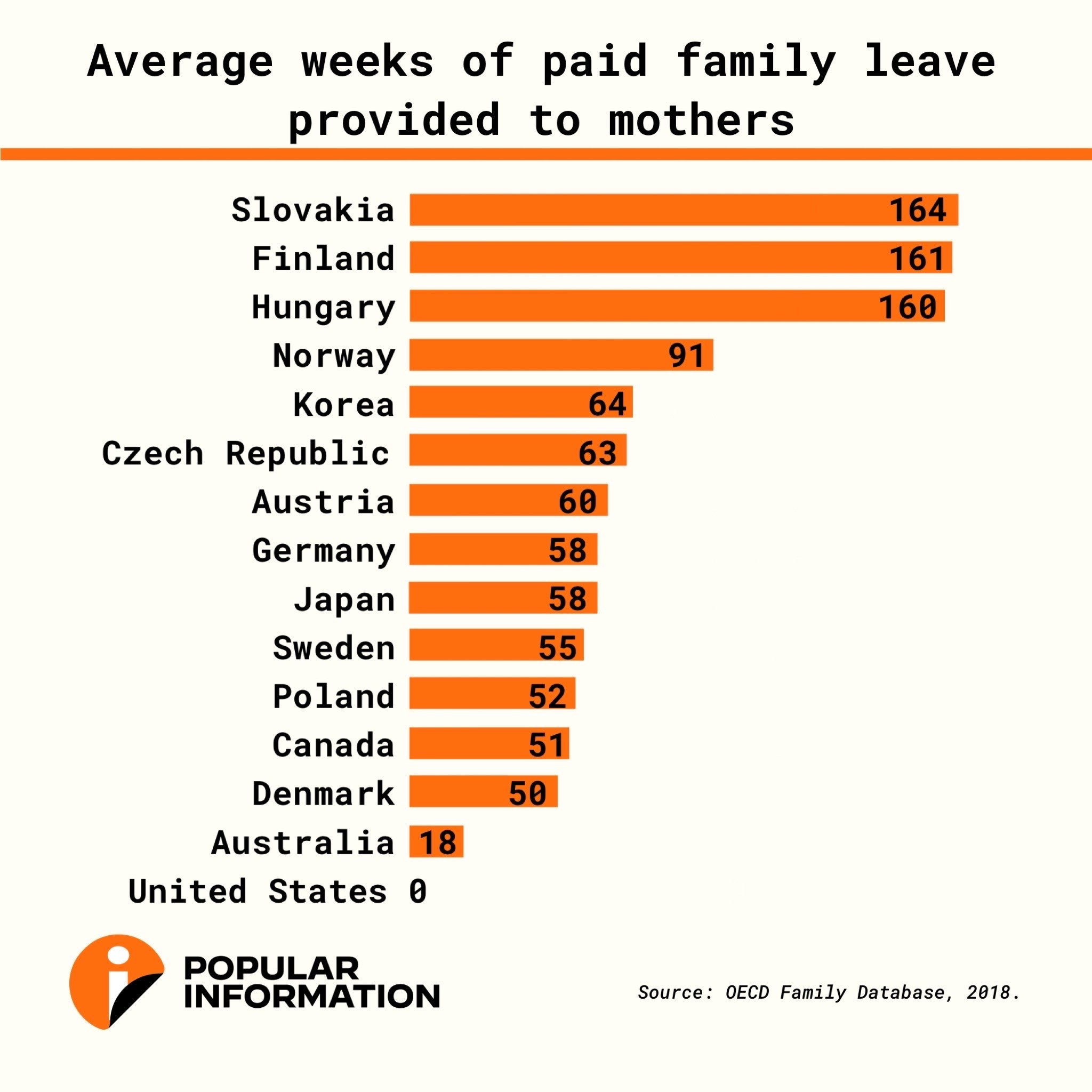The shameful treatment of American families
Here is how social media works: Corporations collect as much personal information about you as possible and sell it to advertisers. To capture more personal data to sell to advertisers, they make their products addictive. The algorithms feed you content to try to keep you on the platform — whether or not it's true. Social networks are free, but you are the product. Here is how this newsletter works: We never collect or sell any personal information about you. We do not accept advertisements. We work hard to unearth factual information on issues that really matter. And we deliver it concisely, directly to your inbox. Popular Information is available free, but it only exists because of the support of readers like you. For more accountability journalism follow us on Twitter or Instagram. When it comes to supporting families, the United States of America is stuck in the dark ages. There are many kinds of family leave, but the most common is paid maternity leave for new mothers. Among the 38 developed countries, generally defined as the members of Organization for Economic Co-operation and Development (OECD), only the United States has no paid maternity leave at the national level. Among other OECD countries, a group that includes the European Union, Japan, Australia, and the UK, the average paid maternity leave benefit was 51 weeks in 2018. While the United States continues to offer no national paid family leave, other OECD countries have expanded their programs. The length of paid maternity leave continues to grow. Mothers in Finland now receive 161 weeks of paid leave. And more OECD countries are offering similar benefits to fathers. Korea and Japan provide a full year of paid paternity leave to new fathers. On average, OECD countries now provide more than 9 weeks of paid paternity leave. Paid family leave reflects the reality of the modern world — most parents also have a full-time job. Other OECD countries have invested in paid family leave because of substantial benefits to parents, children, and the economy. The potential benefits in the United States become clear by comparing the handful of states that offer paid family leave — including California, New Jersey, Rhode Island, New York, and Washington — to the nation as a whole. A 2017 study found "access to paid parental leave enables parents to spend more time with their children at or around the time of childbirth, which can advance childhood health and development." Paid family leave "is associated with a reduction in low birth weight babies and lower rates of infant and child mortality, controlling for income and other factors that affect children’s health." The potential benefits extend far into the future. Children from families with access to paid maternity leave had "lower high school dropout rates and higher wages...at age 30." There are also broader economic benefits. The National Partnership for Women and Families found "paid leave programs improve the labor force participation of family caregivers, reduce the likelihood that new mothers would fall into poverty and increase household incomes, and mean working people are significantly less likely to use SNAP or other public support programs in the year after a child’s birth." Absent federal legislation, most private employers are not offering paid family leave to their employees. At present, just 19% of Americans — mostly high-wage workers — have access to paid family leave through their employer. A 2012 survey found that nearly one-in-four mothers return to work within two weeks of giving birth. (The Family and Medical Leave Act, which became law in 1993, only provides unpaid leave in certain circumstances.) A comprehensive paid family leave benefit is outrageously popular across party lines. A 2018 survey found that 84% of Americans support a paid family leave policy "that would cover all working people who need leave to care for a newborn or newly adopted child; their own serious illness or injury; a seriously ill, injured, elderly, or disabled family member; or to deal with the effects of a deployment or injury of a military service member." After decades of inaction, there is a real opportunity this year for the United States to finally provide paid leave to working families. But the proposal faces fierce opposition from corporations, Republicans, and even some Democrats. A modest proposalPaid family leave is part of Biden's "American Families Plan," which is currently winding its way through Congress. The Biden proposal would provide paid family leave in a wide range of circumstances, including " for the birth or adoption of a child, to care for a family member with a medical condition or for a personal serious health condition." But the length of the leave is relatively modest. Americans would be eligible for 12 weeks of paid family leave. That's about five fewer weeks than the OECD average of paid maternity leave in 1970. Biden's proposal would phase the 12-week benefit in over a decade to reduce the cost. Two versions of the proposal being considered in the House and Senate would make the full benefit available immediately. The Biden proposal would provide "workers up to $4,000 a month, with a minimum of two-thirds of average weekly wages replaced, rising to 80 percent for the lowest wage workers." The House and Senate versions might up the maximum monthly benefit to $4,800. The corporate oppositionThe paid family leave proposal is being included as part of a reconciliation package, which means it could be approved in the Senate without any Republican support. The U.S. Chamber of Commerce, which represents nearly all major corporations, is doing everything it can to make sure that doesn't happen. The Chamber is forming "an economy-wide coalition to coordinate the fight against the...economic package, including its significant price tag, policy scope and potential for tax increases." In addition to paid leave, the package also includes provisions related to health care, education, and other issues. In a press release, the Chamber pledged to "do everything we can to prevent this tax raising, job killing reconciliation bill from becoming law." Biden would pay for a paid family leave benefit and other provisions by raising "the corporate [tax]rate to 28 percent from 21 percent" and making other changes that make it more difficult for corporations to avoid taxes by shifting profits overseas. While American families have spent decades without paid family leave, corporate profits reached a record $2.8 trillion in the second quarter of 2021. The Chamber's effort could "encompass traditional lobbying on Capitol Hill as well as advertising campaigns targeting Democratic lawmakers." It could also form an alliance with "the National Association of Manufacturers, whose board includes executives from firms such as Dow Inc., Exxon, Caterpillar and Johnson & Johnson." Other corporate groups opposing the measure include "the Business Roundtable, whose board counts the chief executives from Apple and Walmart" and PhRMA. About 200 companies are calling on Congress to pass paid leave legislation — including SalesForce, Patagonia, Atlassian, and Stitch Fix. The group says that "paid leave also leads to better retention, personal health, and improved morale, which contributes to greater stability and viability for our businesses, ultimately helping our bottom line." These companies, however, are not driving the agenda at the Chamber or other powerful corporate lobbying groups. The Democratic oppositionNo Republican in Congress is expected to support the reconciliation package or its paid family leave benefit. But the package also faces opposition from some Democrats. Senator Joe Manchin (D-WV) called for a "strategic pause" on advancing the legislation, citing concerns about "inflation and debt." But the proposals are fully paid for by tax increases on corporations and the wealthy, which means they would not be inflationary or add to the debt. Earlier, Manchin said the reconciliation package is “not anything we need immediately.” Similarly, Senator Kyrsten Sinema (D-AZ) says that "she will not support a budget reconciliation bill that costs $3.5 trillion." Which raises the question: Why can every other developed country afford to have paid family leave, except the United States? |
Older messages
These corporations bankrolled the sponsors of Texas' abortion ban
Tuesday, September 7, 2021
Texas just enacted the nation's most draconian abortion ban, prohibiting all abortions after six weeks — before many women even know they are pregnant. There are no exceptions for rape or incest.
Where are the anti-war voices?
Thursday, August 19, 2021
Yesterday's newsletter detailed how the media is largely overlooking voices that supported Biden's decision to withdraw from Afghanistan. Instead media reports are almost exclusively
The media's systemic failure on Afghanistan
Wednesday, August 18, 2021
After two decades of war, President Biden finally made the decision to fully withdraw US forces from Afghanistan. It did not go as planned. The Afghan government and security forces, which the United
The January 6 corporate accountability index
Tuesday, August 17, 2021
After a violent mob stormed the Capitol building in January, hundreds of corporations pledged to make changes to their political giving. Some corporations pledged to withhold PAC funding to the 147
How to unrig democracy
Monday, August 16, 2021
The Census Bureau has finally released the granular data from the 2020 Census that will allow states to begin the redistricting process. The only thing at stake is the future of democracy itself.
You Might Also Like
Gates, Ballmer, and other Microsoft alums remember Mike Maples Sr.
Friday, January 10, 2025
New layoffs at Redfin | 5 key AI energy solutions from Amazon and Microsoft ADVERTISEMENT GeekWire SPONSOR MESSAGE: GeekWire's special series marks Microsoft's 50th anniversary by looking at
☕ Bold fashioned
Friday, January 10, 2025
The year ahead in fashion. January 10, 2025 View Online | Sign Up Retail Brew Hey there. If you want a feel-good retail story, this one hits the sweet spot. A TODAY segment this week highlighted the
Everything we got right and wrong in 2024, Part 1.
Friday, January 10, 2025
Looking back on our prescient takes and our big misses. Everything we got right and wrong in 2024, Part 1. Looking back on our prescient takes and our big misses. By Isaac Saul • 10 Jan 2025 View in
Traitors Secrets, Jon Ronson, and the Flywheel of Brand
Friday, January 10, 2025
10 stories that have given us creative inspiration this week
GeekWire Startups Weekly
Friday, January 10, 2025
News, analysis, insights from the Pacific NW startup ecosystem View this email in your browser Gaming industry outlook: What's ahead for Microsoft, Amazon, Valve, and startups in 2025 Read more »
Frostbite Flute
Friday, January 10, 2025
Frostbite // Neanderthal Bone Flute Music Frostbite Flute By Caroline Crampton • 10 Jan 2025 View in browser View in browser The full Browser recommends five articles, a video and a podcast. Today,
🍿 ‘Den of Thieves 2’ Is A Shockingly Good Time
Friday, January 10, 2025
Plus: We sit down with the CEO who unintentionally leaked Nintendo Switch 2's secret weapon. Inverse Daily 'Den of Thieves 2: Pantera' is bigger and better, but retains the original's
☕ Regulatory futures
Friday, January 10, 2025
Plus AI's policy head on federal AV regulations. January 10, 2025 View Online | Sign Up Tech Brew It's Friday. Tech Brew's Jordyn Grzelewski has been pinging all over Las Vegas, searching
Down bad at the movies
Friday, January 10, 2025
Plus: California's wildfires continue, Tibetan boarding schools, and more. January 10, 2025 View in browser Alex Abad-Santos is a senior correspondent who covers all of our cultural obsessions.
Five Presidents Honor Carter, Notre Dame Wins, and a Deer at the Door
Friday, January 10, 2025
All five living US presidents gathered at the Washington National Cathedral for the funeral of former President Jimmy Carter on Thursday, honoring the 39th president who passed away in late December at




